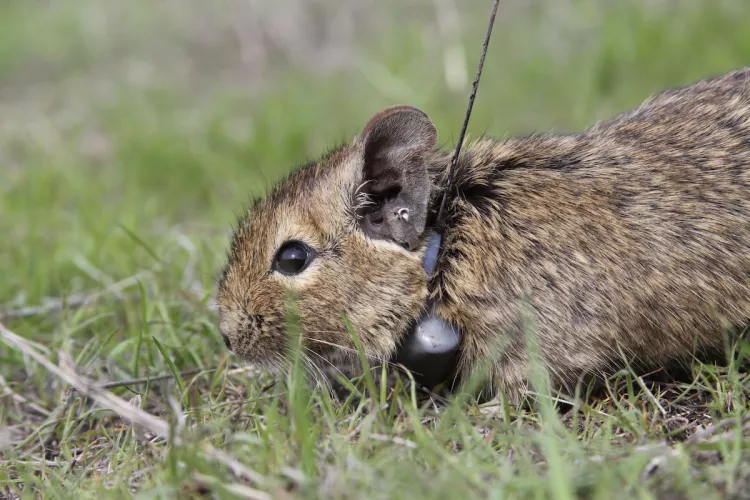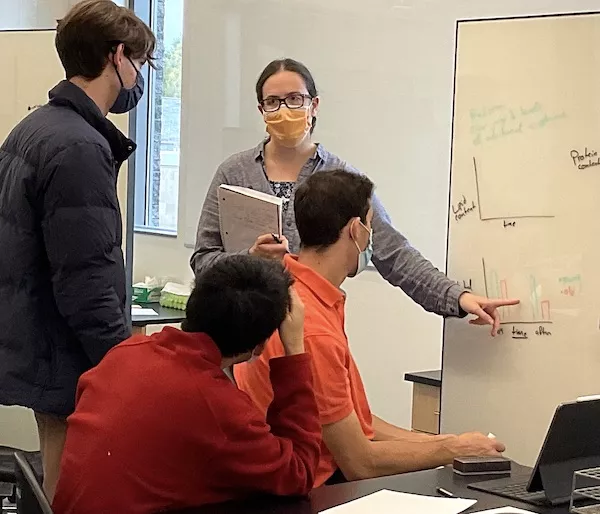Carolyn Bauer

Courses:
Biol 020. Animal Physiology
The topics covered in Biol 20 include neuroendocrine, muscular, cardiovascular, respiratory, renal, digestive, thermoregulatory, and reproductive systems. These topics will be explored both in lecture and lab. The objective of the course is to understand how animals maintain homeostasis. This class requires critical thinking and also has a significant writing component.

Research:
I am interested in the plasticity of different physiological systems over an animal’s lifetime. For example, if an animal is born into an environment with high predation pressure, does this animal develop a highly reactive endocrine stress response? Furthermore, does this developmental trajectory increase the animal's chance of surviving and reproducing in a high predation environment? And finally, will this animal have a reactive stress response its whole life, or can the reactivity of the endocrine stress response change throughout its life? While my previous work has mostly focused on the endocrine stress response, I am also interested in how environmental cues may adaptively affect the development of other physiological systems, especially water balance physiology and metabolism.
To answer these questions, I study the degu (Octodon degus), which is a small rodent native to central Chile. Degus essentially look like guinea pigs with long, brush-tipped tails, and they are a fantastic model organism because they're highly social, easy to repeatably capture, and experience significant environmental variation. I work with wild populations of degus in central Chile in collaboration with U.S. and Chilean colleagues.
I am also very interested in the effects of parental separation. We know quite well that separating children from their parents causes a whole host of negative health consequences, but I'm interested in whether certain circumstances, such as remaining with a known non-parent caregiver, can mitigate the negative effects of parental separation. Additionally, while most research has focused on how separation affects the offspring, few studies have examined how separation affects parents. Degus are great model organisms for this research as they practice plural breeding with communal care, meaning that several parents raise their offspring in a common area and will provide care for each other's offspring. Furthermore, both female and male degus provide parental care to offspring.

Daniela Kim ’23, a bioeducation special major from Weston, Fla., worked with Carolyn last summer on a behavioral study of how fostering affects postnatal development of the degu. more Laurence Kesterson
Teaching:
I enjoy teaching biology. My main goal as an instructor is to create an interactive learning environment, and I challenge my students to examine knowledge in different contexts, to recognize and value the scientific process, and to appreciate the integrative nature of biology. Finally, I am dedicated to being a supportive teacher for all my students, and I try very hard to foster an inclusive learning environment for students of all backgrounds.
Publications:
(*denotes student mentee)
Malcangi, S.*, Lam, C.*, Sam, A.*, León, C., Ramírez -Estrada, J., and Bauer, C.M. (2020). Postnatal maternal stress decreases social and locomotive play behaviors in Octodon degus pups. Journal of Ethology, 38:207-213.
Graham, J.L., Needham, K.B., Bertucci, E.M., Pearson, A.A., Bauer, C.M., and Greives, T.J. (2019). Onset of daily activity in a female songbird is related to peak-induced estradiol levels. Integrative and Comparative Biology, 59:1059-1067.
Bauer, C.M., Graham, J.L., and Greives, T.J. (2019) Corticosterone negative feedback is weaker during spring vs. autumn migration in a songbird (Junco hyemalis). General and Comparative Endocrinology, 280:36-42.
Graham, J.L, Bauer, C.M., Heidinger, B.J., Ketterson, K.E., and Greives, T.J. (2019) Early breeding females experience greater telomere loss. Molecular Ecology, 28:114-126.
Needham, K.B., Bergeon Burns, C., Graham, J.L., Bauer, C.M., Kittilson, J., Ketterson, E.D., Hahn, T., and Greives, T.J. (2019) Changes in processes downstream of the hypothalamus are associated with seasonal follicle development in a songbird, the dark-eyed junco (Junco hyemalis). General and Comparative Endocrinology, 270:103-112.
Bauer, C.M., Correa, L.A., Ebensperger, L.A & Romero, L.M. (2019) Stress, sleep, and sex: a review of endocrinological research in Octodon degus. General and Comparative Endocrinology, 273:11-19.
Bauer, C.M.†, Fudickar, A.M.†, Anderson-Buckingham, S.*, Abolins-Abols, M.A., Atwell, J.W., Ketterson, E.D., and Greives, T.J. (2018) Seasonally sympatric but allochronic: differential expression of hypothalamic genes in a songbird during gonadal development. Proceedings of the Royal Society B: Biological Sciences 285:20181735. †co-first authors
Bauer, C.M., Graham, J.L., Abolin-Abols, M., Heidinger, B.J., Ketterson, E.D., and Greives, T.J. (2018) Chronological and Biological Age Predict Seasonal Reproductive Timing: An Investigation of Clutch Initiation and Telomeres in Birds of Known Age. American Naturalist 191: 777-782.
DuRant, S.E., Arciniega, M.*, Bauer, C.M. & Romero, L.M. (2016) A test of reactive scope: reducing scope causes delayed wound healing. General and Comparative Endocrinology 236: 115-120.
Bauer, C.M., Heidinger, B.J., Ketterson, E.D. & Greives, T.J. (2016) A migratory lifestyle is associated with short telomeres in a songbird (Junco hyemalis). The Auk: Ornithological Advances 133: 649-653. *Featured in Auk press release July 27th, 2016
Bauer, C.M., Ebensperger, L.A., León, C., Ramírez-Estrada, J., Hayes, L.D. & Romero, L.M. (2016) Post-natal development of the degu (Octodon degus) endocrine stress response is affected by maternal stress and care. Journal of Experimental Zoology Part A: Ecological Genetics and Physiology 325: 304-317.
Bauer, C.M., Needham, K.B., Le, C.L., Stewart, E.C., Graham, J.L., Ketterson, E.D. & Greives, T.J. (2016) Hypothalamic-pituitary-adrenal axis activity does not suppress reproductive development in Dark-eyed Juncos (Junco hyemalis) preparing for migration. General and Comparative Endocrinology 232: 60-66.
Bauer, C.M., Hayes, L.D., Ebensperger, L.A., Ramírez-Estrada, J., León, C., Davis, G.T. & Romero, L.M. (2015) Maternal stress and plural breeding with communal care affect development of the endocrine stress response in a wild rodent. Hormones and Behavior 75: 18-24.
Lapointe, M.A.*, Bauer, C.M. (corresponding author), Ebensperger, L.A., Reed, J.M. & Romero, L.M. (2015) Live-trapping is not biased by the endocrine stress response: a preliminary study in the degu (Octodon degus). Journal of Mammalogy 96: 762-771.
Bauer, C.M., Hayes, L.D., Ebensperger, L.A. & Romero, L.M. (2014) Seasonal variation in the degu (Octodon degus) endocrine stress response. General and Comparative Endocrinology 197: 26-32.
Bauer, C.M., Skaff, N.K.*, Bernard, A.B.*, Trevino, J.M.*, Ho, J.M., Romero, L.M., Ebensperger, L.A. & Hayes, L.D. (2013) Habitat type influences endocrine response in the degu (Octodon degus). General and Comparative Endocrinology 186: 136-144.
Bauer, C.M., Nachman, G., Lewis, S.M., Faust, L.F. & Reed, J.M. (2013) Modeling effects of harvest on firefly population persistence. Ecological Modelling 256: 43-52.
Lattin, C.R., Waldron-Francis, K., Richardson, J.W., deBruijn, R., Bauer, C.M., Breuner, C.W. & Romero, L.M. (2012) Pharmacological characterization of intracellular glucocorticoid receptors in nine tissues from house sparrow (Passer domesticus). General and Comparative Endocrinology 179: 214-220.
Lattin, C.R., Bauer, C.M., de Bruijn, R. & Romero, L.M. (2012) Hypothalamus-pituitary-adrenal axis activity and the subsequent response to chronic stress differ depending upon life history stage. General and Comparative Endocrinology 178: 494-501.
Keyel, A.C., Bauer, C.M., Lattin, C.R., Romero, L.M. & Reed, J.M. (2012) Testing the role of patch openness as a causal mechanism for apparent area sensitivity in a grassland specialist. Oecologia 169: 407-418.
Bauer, C.M., Glassman, L.G.*, Cyr, N.E. & Romero, L.M. (2011) Effects of predictable and unpredictable food restriction on the stress response in molting and non-molting European starlings (Sturnus vulgaris). Comparative Biochemistry and Physiology, Part A 160: 390-399.
Atwater, D.Z., Bauer, C.M. & Callaway, R.M. (2011) Indirect positive effects ameliorate strong negative effects of Euphorbia esula on a native plant. Plant Ecology 212: 1655-1662.
Wacker, D.W., Coverdill, A.J., Bauer, C.M. & Wingfield, J.C. (2010) Male territorial aggression and androgen modulation in Alaskan populations of the sooty, Passerella iliaca unalaschcensis, and red fox sparrow, Passerella iliaca iliaca. Journal of Ornithol. 151:79-86.
Book Chapters:
Romero, L.M., Bauer, C.M., de Bruijn, R. & Lattin, C.R. 2017. Seasonal Rhythms. In Handbook of Stress, Volume 2: Neuroendocrinology and Endocrinology, ed. G. Fink, 421-427. Oxford: Academic Press.




